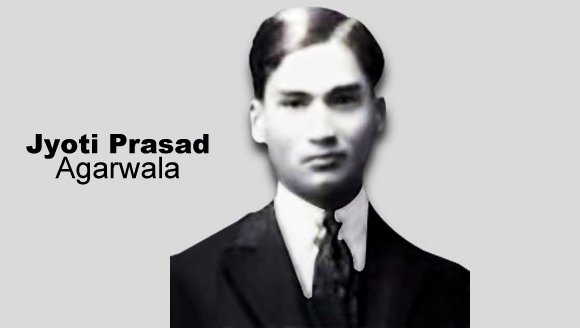The doyen of Assamese culture, Jyoti Prasad Agarwala was a poet of immense radiance, a musician of rare competence, an artist of exceptional achievement, a fervent activist and a great humanist who tramped like a colossus in the cultural realm of Assam for more than 2 decades. He was the first film maker of Assam and is the cultural icon of the state. He is considered as the prince of artists of the state, who stood out appreciably and continued to inspire the future generations with his unshakeable faith in the ultimate victory of good over evil, truth over lie and beauty over malice.
 |
| Rupkonwar Jyoti Prasad Agarwala |
Jyoti Prasad Agarwala was born on 17 June 1903 in Tamulbari Tea Estate of Assam to Paramananda Agarwala and Kiranmoyee Agarwala. His forefather, Nabrangram Agarwala, had come to Assam in 1811 from the Marwar region in Rajasthan. He completed his matriculation in the year 1921 and went to Edinburgh to study economics. In the year 1930, he spent seven months at UFA studio in Germany fin learning Film Making. Returning home, Jyoti Prasad Agarwala got involved in Indian independence movement. Due to his involvement in the movement, Jyoti Prasad was imprisoned for 15 months in 1932. After release from jail, Agarwala decided to start a film based on a play by Laxminath Bezbarua. He established Chitraban Studio, the first film studio in Assam, at the Bholaguri Tea Estate. The filming of Joymoti started in 1933 and was finally released in 1935. His film Joymoti was a tale of Ahom princess Sati Joymoti, who was imprisoned and tortured till death by Ahom swargadeo (king) because she refused to betray her husband.
Agarwala was a great writer and a poet, who started writing at a very tender age of 14 years. He along with Kalaguru Bishnu Rabha wrote several plays, which earned him a lot of fame. In the year 1936, Agarwala tied the knot with Devajani Chaliha. His second film Indramalati, was released on 1939 and in 1941, he started to actively participate in the freedom movementof India. Later in 1942, in order to avoid British repression, Jyoti Prasad Agarwala had to go underground. Rupkonwar Jyoti Prasad Agarwala has around 300 songs, 9 plays, two films and two poetry collections in his name. His songs are considered as a separate genre in Assamese music and are called as Jyoti Xongit. The names of his plays are Sont Kunwori, Rupalim, Karengor Ligiri, Nimati Konya, Sonpakhilee, Kanaklata, Sundar Konwar and Lobhita. On January 17, 1951, Rupkonwar Jyoti Prasad Agarwala died of cancer. To commemorate this legendry artist of Assam, every year Shilpi Divas is celebrated with grandeur all over the state on his death anniversary.




No comments:
Post a Comment